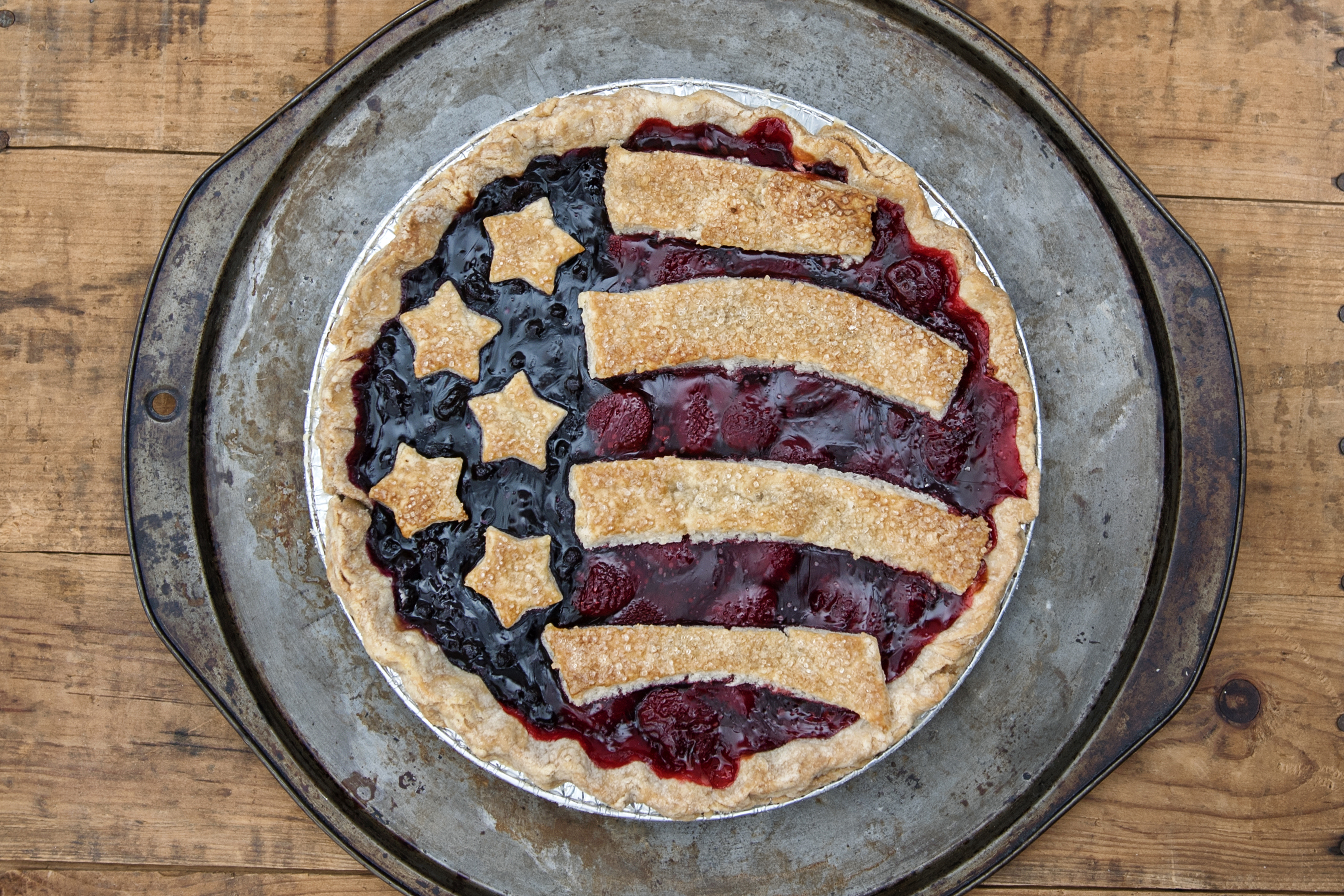How to make America better, one Thanksgiving table at a time
Can Thanksgiving heal America? Maybe. But we have to start by applying the lessons of grace and hospitality at home.


A free daily email with the biggest news stories of the day – and the best features from TheWeek.com
You are now subscribed
Your newsletter sign-up was successful
Across the nation, there is trepidation of imminent holiday dinner rancor. Everyone seems agitated over their Thanksgiving family gatherings and the fierce political conversations that will inevitably ensue. We anticipate debates over President Trump, sexual misconduct, and "fake news." No one seems to want any part of it. For some, the dread is so great, they are skipping Thanksgiving dinner altogether.
It's difficult to blame them. Our nation is almost entirely red or blue — there is no place that is purple, no in between. Thanksgiving dinner is one of the few times all year where we break bread with those who share our blood but not our beliefs.
America's divide reflects a deepening enmity between our two political "sides": Pew Research Center found that both parties increasingly see each other's policies as a threat to our national wellbeing, calling their political opposites "close-minded" or "lazy." Generational and geographic divisions are sharpening, as are differences in media-watching and listening, cultural ideology, and religious belief.
The Week
Escape your echo chamber. Get the facts behind the news, plus analysis from multiple perspectives.

Sign up for The Week's Free Newsletters
From our morning news briefing to a weekly Good News Newsletter, get the best of The Week delivered directly to your inbox.
From our morning news briefing to a weekly Good News Newsletter, get the best of The Week delivered directly to your inbox.
This means that, for many families, Thanksgiving is an increasingly fraught time — because the holiday often means a mixing of red and blue, a throwing together of left and right. Is it possible, as political division and rancor grow so prevalent, to still enjoy Thanksgiving? Can we step away from the hostility and embrace peace?
In answering this question, it's important to first consider what Thanksgiving is, and why it matters. The first Thanksgiving dinner is shrouded in myth and uncertainty. All that is certain is that the Plymouth settlers gathered with the Wampanoag tribe in the autumn of 1621 to celebrate their harvest season. But since that first gathering, Thanksgiving has taken on trappings and customs all its own. There's a series of consumerist- and family-driven traditions we tie to the day: from parades and football games to candlelit dinners and kitchen camaraderie. For many, the day is still — at least on an abstract level — about "giving thanks." But much of it, in practice, is about comfort: gastronomic, material, and relational.
This helps explain why family friction feels so disparate, so at odds with the rest of our expectations surrounding Thanksgiving. The feast is about making us happy, correct? About fulfilling our desires for pumpkin pie and stuffing, football and colorful parade floats?
Perhaps not. As delightful as all those things are, Thanksgiving could also be about something more. After all, the entire Thanksgiving dinner rests on the premise of hospitality: that of opening our doors and tables to those who are outside and other. In ancient times, the hospitable opened their doors to strangers and aliens, as hotels were an infrequent option to the traveling sojourner. That larger understanding of hospitality — as a virtuous extension of hearth and home — still exists, buried as it might be under the Martha Stewart magazines and fancy table settings. We know, if only on a subconscious level, that the holiday isn't just about enjoying our peers — it is about extending grace and liberality to the unknown or "other." As Leon Kass points out in The Hungry Soul, "Hospitality is one of the civilized and civilizing customs at the foundation of most if not all political communities." As a uniquely American holiday, it is significant that Thanksgiving rests entirely upon the presumption of hospitality.
A free daily email with the biggest news stories of the day – and the best features from TheWeek.com
On a more obvious and oft-acknowledged level, Thanksgiving is about gratitude — or at least, it is supposed to be. The Plymouth settlers gave thanks to God for bounty in the face of imminent desperation. For us, different gifts may push us toward gratitude; but it is important to point back to the virtue's roots in the concept of grace. Verbalizing gratitude is, after all, an extension of grace to the thanked. It suggests a deference, an open-eyed acknowledgement of the other, that we're tempted to overlook in our more insular and individualistic time. Gratitude requires the ability to look beyond oneself, and see the sacrifice or generosity of the other. It requires empathy, humility, and love. It is grace that encourages us to hug our grandmothers, and thank them for their tireless work in preparing turkey and table every year (my word of advice to you: do it before it's too late). It's grace that urges us to thank our grandfather or uncle for advice (asked for or no) on getting through college finals.
In a nation as divided as ours, we need more — not less — opportunities to foster empathy. As Stacy Branham recently pointed out in Time, "A review of empathy research from the past 30 years revealed that college-age Americans were less able to imagine others' perspectives and feel sympathy for their plight. … At the same time, the number of Americans who report that there is no one with whom they discuss important matters nearly tripled, to roughly 25 percent of the population, between 1985 and 2005."
Building out and fostering a politically "purple" table helps fulfill the holiday's deeper meaning, while giving us an opportunity to step away from our Facebook bubbles and Twitter wars for deeper, more meaningful connection.
Sarah Silverman has demonstrated this recently with her new Hulu series, I Love You, America. In it, she endeavors to connect with Americans who are different from her. During a meal she spends with a Republican family in Louisiana, questions and disagreement don't lead to rancor. There's laughter, understanding, and generous pushback instead. Silverman suggests that, if we truly try, we can break bread with the political "other" — and not kill ourselves in the effort.
This doesn't mean celebrating Thanksgiving with Fox News-watching Grandpa Bob (or Bernie-worshiping cousin Ed) will be easy. But it may, in fact, be just what we need. In talking to others who've regularly spent their Thanksgivings with their political and ideological opposites, some thoughtful suggestions rose to the surface: Ask lots of questions. Express heartfelt care and concern for attendees' personal lives. Delve into family history and lore with older relatives. Ask what books people have read recently. Talk about sports, favorite films, or cooking tips. If politics come up, seek to ask more questions than you answer. Take this opportunity to try and understand why this relative believes what they do. Seek to understand how they've come to this point. Look for points where you might agree.
Let's be honest: We would much rather spend Thanksgiving focusing on fuzzy warm feelings and delicious pie. But there are some larger (and harder) virtues which we ought to cultivate during Thanksgiving's festivities. Because while our country may be fraught, fractured, and polarized, our Thanksgiving tables don't have to be. It all depends on grace.
Gracy Olmstead is a writer and journalist located outside Washington, D.C. She's written for The American Conservative, National Review, The Federalist, and The Washington Times, among others.
-
 How the FCC’s ‘equal time’ rule works
How the FCC’s ‘equal time’ rule worksIn the Spotlight The law is at the heart of the Colbert-CBS conflict
-
 What is the endgame in the DHS shutdown?
What is the endgame in the DHS shutdown?Today’s Big Question Democrats want to rein in ICE’s immigration crackdown
-
 ‘Poor time management isn’t just an inconvenience’
‘Poor time management isn’t just an inconvenience’Instant Opinion Opinion, comment and editorials of the day
-
 The billionaires’ wealth tax: a catastrophe for California?
The billionaires’ wealth tax: a catastrophe for California?Talking Point Peter Thiel and Larry Page preparing to change state residency
-
 Bari Weiss’ ‘60 Minutes’ scandal is about more than one report
Bari Weiss’ ‘60 Minutes’ scandal is about more than one reportIN THE SPOTLIGHT By blocking an approved segment on a controversial prison holding US deportees in El Salvador, the editor-in-chief of CBS News has become the main story
-
 Has Zohran Mamdani shown the Democrats how to win again?
Has Zohran Mamdani shown the Democrats how to win again?Today’s Big Question New York City mayoral election touted as victory for left-wing populists but moderate centrist wins elsewhere present more complex path for Democratic Party
-
 Millions turn out for anti-Trump ‘No Kings’ rallies
Millions turn out for anti-Trump ‘No Kings’ ralliesSpeed Read An estimated 7 million people participated, 2 million more than at the first ‘No Kings’ protest in June
-
 Ghislaine Maxwell: angling for a Trump pardon
Ghislaine Maxwell: angling for a Trump pardonTalking Point Convicted sex trafficker's testimony could shed new light on president's links to Jeffrey Epstein
-
 The last words and final moments of 40 presidents
The last words and final moments of 40 presidentsThe Explainer Some are eloquent quotes worthy of the holders of the highest office in the nation, and others... aren't
-
 The JFK files: the truth at last?
The JFK files: the truth at last?In The Spotlight More than 64,000 previously classified documents relating the 1963 assassination of John F. Kennedy have been released by the Trump administration
-
 'Seriously, not literally': how should the world take Donald Trump?
'Seriously, not literally': how should the world take Donald Trump?Today's big question White House rhetoric and reality look likely to become increasingly blurred
